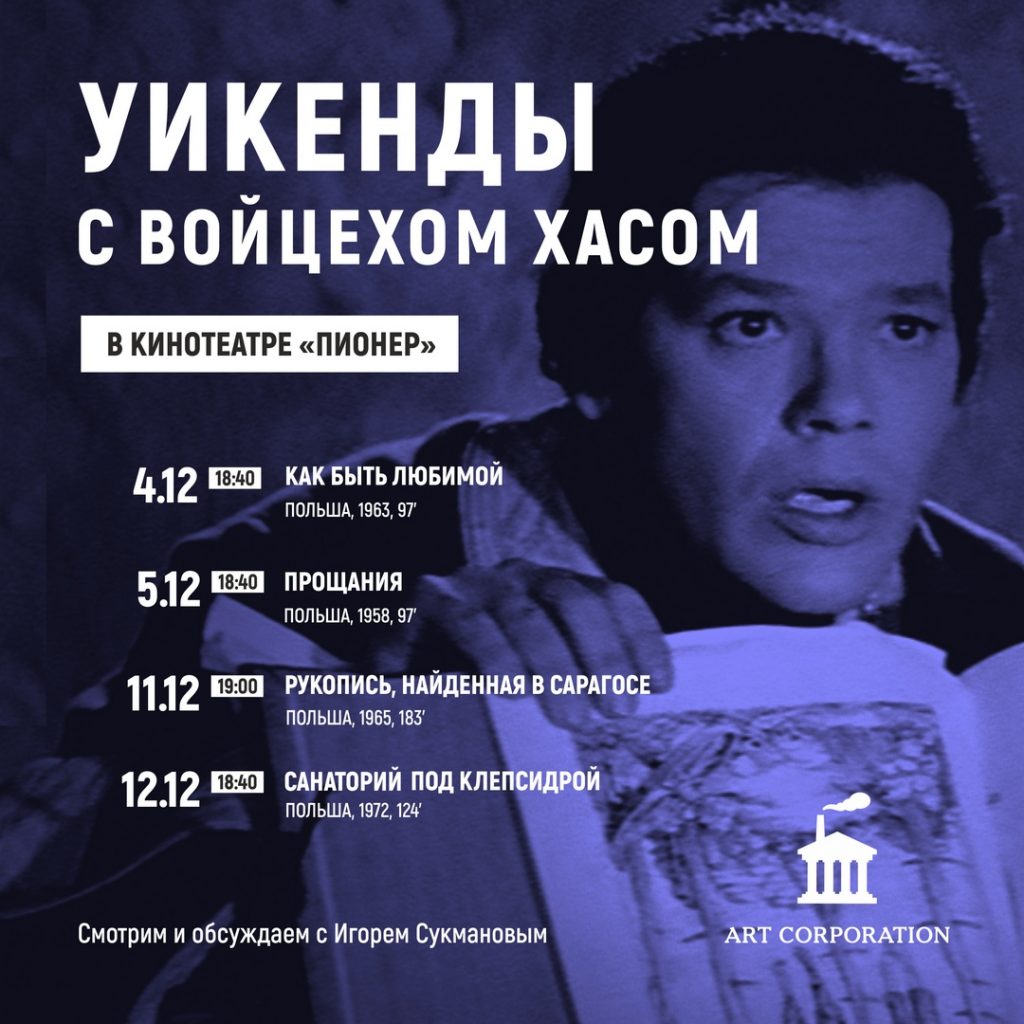On December 4, 5, 11, 12, 2020, at the Pioner cinema, we will show four iconic films by director Wojciech Has. Spectators will have the opportunity to spend 2 weekends watching 4 restored films – the pearls of world cinema. “Weekends with Wojciech Has” is a completely recreated retrospective from the program of the 27th Minsk International Film Festival “Listapad”. The program director of the MIFF “Listapad” will help to choose the “magic” keys to these works, with which viewers will be able to discuss the films after screenings. A special exhibition of posters for Has’s films will help you to feel the aesthetics of the mysterious Polish genius – it will be displayed in the lobby of the Tsentralny cinema until December 12.

Wojciech Has was admired by Martin Scorsese, Francis Ford Coppola, David Lynch, Luis Buñuel. His films were ranked among the classics of surrealism, avant-garde and Eastern European existentialism. At the same time, Has always played the role of a hermit director. He kept the shadow and seemed to be hiding behind the backs of his phenomenally gifted colleagues Andrzej Wajda, Krzysztof Kieslowski, Roman Polanski. His brilliant masterpieces are trying to reproduce the logic of sleep and are devoid of sharp expressive techniques and attractions. He directed love films “without love,” populous frescoes “without pipes and drums,” melodramas and horrors as unidentified intellectual charades. He tended towards deep-focus photography, decoration of the frame, complex staged camera movements. He talked in his films about alienation and longing without a hint of boredom and snobbery. Wojciech Has became known not only for his unique style in feature films, but also as a director of documentary and popular science films. In addition, Has for a long time was the head of the film school in Lodz, one of the most respected in Eastern Europe.
As part of the retrospective “Weekends with Wojciech Has”, four films will be shown that are the most significant in the director’s career: “Pozegnania”, “Sanatorium pod klepsydra”, “Rekopis znaleziony w Saragossie”, and “Jak byc kochana”.
4 December. “Jak byc kochana” (1963, Poland), 97 minutes
San Francisco International Film Festival (USA) – awards for the best film, best script, best actress (Barbara Krafftówna)
The Cannes Festival (France) – participant of the main competition programme
On the way from Warsaw to Paris, actress Felicia recalls the past war. During the years of occupation, she hid a colleague in her room, the actor Victor, who was mistakenly considered an underground worker and was sentenced to death. Weak and cowardly, he suffered most of all from the inability to indulge his vanity and pride and show his imaginary courage on stage. After the war they part, and Victor is accused of treason …
5 December. “Pozegnania” (1958, Poland), 97 minutes
The Locarno Film Festival (Switzerland) – FIPRESCI AWARD (1959)
The heroes of the film are Pavel from a conservative bourgeois family and his beloved Lidka, a paid partner in a dance hall. Young people belong to different social classes and are soon forced to split up, unable to resist prejudices. Time passes, the war begins …
11 December. “Rekopis znaleziony w Saragossie” (1965, Poland), 183 minutes
Special Prize of the Spanish Scriptwriters Association (1972)
Upon finding a book that relates his grandfather’s story, an officer ventures through Spain meeting a wide array of characters, most of whom have a story of their own to tell. The masterpiece of world surrealism cinema is based on the cult novel by Jan Potocki.
12 December. “Sanatorium pod klepsydra” (1973), 124 minutes
The Cannes Festival (France) – Jury award
Jozef arrives at the sanatorium where his father dies. It seems that time has stopped here, and the line between dreams and memories is completely indistinguishable. A man wanders through the dilapidated rooms of the sanatorium, through secluded and mysterious gardens, where images from his childhood appear: historical characters and strangers who look like mechanical dolls. The film is based on the book by Bruno Schulz.
You can watch these films in the cinema hall, where a social distance between the spectators is created with the help of a staggered seating arrangement. We remind you that your main accessory when going to the cinema is a protective mask, which is a must when visiting all public places.
The film distribution in Minsk is organized by Visual and Performing Arts Centre “ART Corporation”. The films are shown with the support of the Adam Mickiewicz Institute and the Polish Institute in Minsk.
Please note that the programme is subject to change.
Follow the news on our website, as well as on Facebook, Instagram, VK.